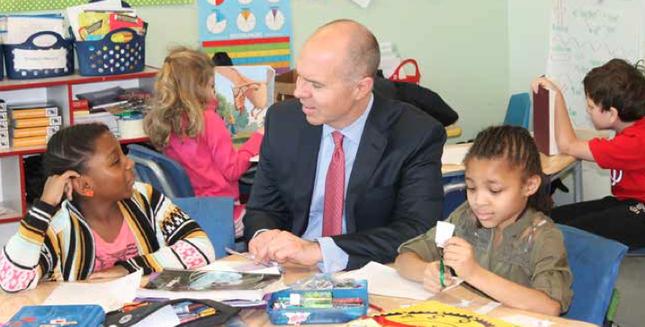David Catania Would Make History If Elected D.C. Mayor
By • November 6, 2014 0 1252

We saw and talked with Independent candidate for mayor David Catania almost a month ago in his campaign headquarters conference room on Connecticut Avenue.
He had a cold.
But he was also upbeat. Polls then were showing a tightening in the mayoral campaign, some shift in direction.
The cold didn’t stop him from talking, sometimes in great detail on issues, policy, on the city he loves, about his mother, and about why he decided to run.
We sat at a long table, framed by a chalkboard behind on which were scribbled, in thick intense writing phrases like: “In It To Win It”; “Good News”; “Next 34 days”; “Backing the Winner” and “Let’s Make History.”
This race has been a long campaign to decide who will head the local government of the nation’s capital. Things shift all the time and change, against a backdrop of a shifting, changing skyline and demographics in the city. Cranes are up, and business in some way is booming and neighborhoods are changing dramatically right in front of people’s eyes.
“Issues,” Catania said, “aren’t simple, not to us as people running for office, not to the people who have to decide whom to vote for, who are trying to understand the issues.”
“There was a time I wasn’t even sure I wanted to stay on the council—I was so depressed about what was happening—the scandals, the pay-for-play, Thomas, Brown and Brown, and the Gray’s campaign being under a cloud, the evident corruption. But then, a friend said, you’d be perfect for heading the education committee, and that’s what got me motivated again, and we accomplished a lot.”
He can make history should he win and outdistance Democratic Primary winner Muriel Bowser. Catania would become the city’s first white mayor, first openly gay mayor and first mayor not to be a Democrat.
But, of course, that’s exactly why his race is such an uphill battle—because he’s not a Democrat, to an extent because he’s not black, although being gay these days may not be much of a handicap anymore. “That’s true, but there’s still a residual thing among older voters, I think, but it is amazing how much things have changed.” One of his singular achievements, and there have been many, is to push for passage of D.C. gay marriage equality law.
Catania was first elected to a District Council at-large seat in 1997, and has been there ever since winning re-elections handily. In order to run for mayor, however, he had to give up what was a very effective base of power. He had probably anticipated that incumbent Mayor Vincent Gray might be his opponent, but that didn’t materialize and made it a very different race.
He isn’t sanguine about the future or full of happy talk. “The growth, sure, that’s great, but you have to manage it and make sure that everybody shares in it,” Catania said. “But that’s not it. There’s potential trouble, because we’re actually in a recession here because of the federal government job cuts which will affect tax revenue and reverberate.”
“Issues aren’t simple,” he repeated. “Let’s look for instance at education resources. Theoretically, all our schools receive the same amount of money from the government. But there’s an inherent inequality here, because the better schools also have additional resources from active PTAs, from involved parents, and that creates a gap which we have to take into account.”
Catania’s education initiatives have been numerous, and includes, notably, passing legislation to approve $80 million for schools serving at-risk students, an example of talk and policy moved into action.
He is something of a wonk, an intense one at that. If you want to know more about the issues and you want to know more about David Catania, check out his little campaign book—“David Catania’s Vision to Secure Our City’s Future”—a slick, costly booklet. It not only details all of his approaches to the issues of running this city but is also filled with color photographs with endorsements from regular citizens. It’s an impressive piece of work, and it reflects how he talks and thinks.
Well, almost.
He has a reputation. There has always been this talk about him: he’s a hot head, he’s arrogant, he holds grudges. “Does not play well with others” could be in there, too. One opponent went so far as to suggest that he’s never gone to a Nationals game because he opposed the ballpark funding.
“I know, I know,” Catania said. “I admit I have a temper. But some of that, well, I’ll admit I’m not very patient. But I like to think that most of it is honest passion and concern.”
That day, he was passionate about two things—talking about his mother Audrey Catania—”she spent her days and nights, working on a small family business. She raised me as a single mother and made sure I got an education. She had street smarts. She was strong and smart.”
Audrey Catania died of cancer in 1990.
“What I’m really glad about is the contact with people, the voters, the residents and citizens of this city,” he said. “You’re out all the time, door to door, and it’s been an amazing experience. This is about transactions. This is where you find out about what concerns people in the city. There’s both optimism, for instance, about the school system, and what hasn’t been done. People want to hear you. They open their doors. They invite you in. They feed you. At this level, it’s about trust. And I don’t think that the people of this city want to go back to business as usual. They want to see things change.”
We saw Catania again on a recent Sunday, at the Dupont Circle market, surrounded by campaign workers with blue t-shirts and signs. He stood talking with a woman intently. It looked like a Catania conversation, focused, and he could go on forever.

